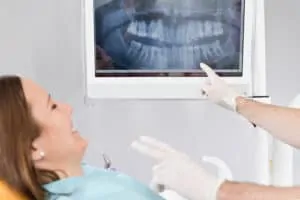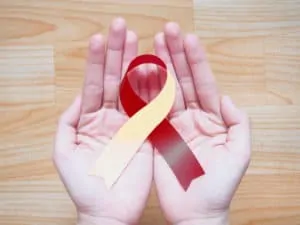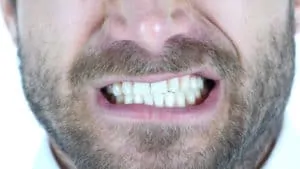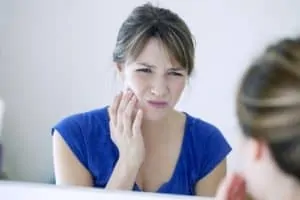Oral Health

What Exactly is A Dental X-Ray?
X-rays (also referred to as radiographs) can be 2D or 3D images that quickly become an important part of how your Sparks dentist prepares an accurate treatment plan. The images give us an idea of what’s going on inside your mouth, highlighting your jaw bone health and tooth structure that lies beneath your gums and enamel. It gives us the added ability to find out if something is going on inside your mouth or teeth that’s not 100 percent visible to the naked eye.
With the advancements in dental technology, there are many different types of x-rays available on both traditional film and digitally. Most dental offices have made the switch to digital x-rays because they tend to emit nearly 80 percent less radiation than film x-rays. Many dentists find that digital x-rays free up appointment times and are easy to save to a patient’s file for future reference and use.
Intraoral and Extraoral: The Two Main Categories of X-Rays
Besides having the ability to be either taken on film or stored digitally, x-rays are divided down into two other categories of either being intraoral or extraoral. How it breaks down is pretty straightforward, and it goes something like this:
Intraoral x-rays – involve any imaging taken from INSIDE your mouth
Extraoral x-rays – involve any imaging taken from OUTSIDE your mouth
Intraoral x-rays give us the chance to see really minute or fine details of both your supporting bone and teeth. They are the most common type of dental x-ray and provide an extremely high level of detail to help us diagnose cavities, examine your tooth roots, look over your bony areas, check the status of developing teeth or ones that have yet to erupt, and more.
Extraoral x-rays are usually relied on to help dentists and orthodontists focus on the bones in your head, particularly your upper and lower jaw. Think of them as x-rays that can help us see the big picture of what’s going on in and around your head and mouth. They help us look at growth and development, monitor impacted teeth, and assess bite issues. Extraoral x-rays tend to be less detailed than the intraoral variety.
Are Dental X-Rays Safe?
Most of the x-rays used in dental offices across the country today give off a minimal amount of radiation. It’s important to note that you should always limit your exposure to x-rays and avoid repeated use as it can damage cells over time due to the small, continued radiation aftereffects.
Dental x-rays are certainly safer than ever thanks to advancements in dentistry over the years. Dentists now rely on using lower x-ray dosages, higher quality film, film holders, and well-designed, full-body aprons lined with lead. It’s important to note though that most of the modern dental x-ray technology that’s available today give off very little stray radiation.
We hope you’ve learned a little bit about dental x-rays and how critical they are in helping your dentist in Sparks make sure your mouth is always in optimal health, from your teeth to your bones. X-rays can help you big time because they allow us to detect issues early before they become more costly to fix down the road. If you have any questions about your dental x-rays or when you’re due for a new set, please don’t hesitate to give us a call.

#1: Calcium can help protect your teeth.
Your bones and teeth store nearly all of the calcium within your body, according to findings from the National Institutes of Health. Calcium can make your teeth more resistant to bad stuff such as cavities and decay.
Besides making your bones and teeth stronger, calcium also helps your muscles and blood vessels work more effectively. Babies need calcium to help their teeth and bones grow strong. Young children are the same way.
#2: Adults need the right amount of calcium in their diet.
Your Sparks dentist will tell you calcium is 100% good for your smile because it can help strengthen your enamel so that you’ve got added protection against early tooth deterioration. That’s why adults should make sure that they monitor their calcium intake too, in order to avoid osteoporosis or brittle bones as they age. But what is the daily recommended amount of calcium for adults? According to the Mayo Clinic it’s around:
MEN
- 19-50 years old – 1,000mg daily
- 51-70 years old – 1,000mg daily
- 71 and older – 1,2000mg daily
WOMEN
- 19-50 years old – 1,000mg daily
- 51 and older – 1,200mg daily
#3: Calcium doesn’t always have to come from dairy.
Helping your smile stay healthy with calcium can be tricky if you struggle with lactose intolerance… or simply don’t eat or like dairy products such as yogurt, cheese, and milk. The good news is that companies are starting to wise up and fortify their food products with calcium. You’ll see this in orange juices, waffles, and even tofu. Canned fish, leafy greens, almonds, beans, and soy milk are calcium-rich dairy substitutes you’re welcome to try at home.
Getting the right amount of calcium in your diet, no matter what your age, is very important to help keep your smile and your gums healthy. It’s really a benefit that your whole body will thank you for. We thank you for reading your blog. If you have any questions about your smile or need to schedule a visit with your dentist in Sparks, call us to get started.

Oral Cancer Statistics
The word “cancer” itself instills some fear in all of us. It’s a scary disease that affects millions of Americans every year. Oral cancer is no different. It’s a widespread problem that can take the lives of those affected. In fact, oral cancer kills one person every hour, every day annually. That’s more than 8,500 people each and every year. This year alone, more than 50,000 people will be diagnosed with oral cancer.
Oral Cancer Symptoms
Being aware of the signs and symptoms of oral cancer can save your life. However, many signs of oral cancer can resemble other non-serious oral health problems. So if you notice any of the signs below and they don’t go away, call your dentist in Sparks as soon as possible to get checked out and ease your mind.
- Pain while swallowing, chewing, or speaking
- Changes in voice
- A sore or discoloration that doesn’t go away after two weeks
- A lump inside the mouth or neck
- Chronic bad breath
The most successful way to treat oral cancer is to diagnose it early. This is also one reason why you should see your dentist at least every six months.
Oral Cancer Risk Factors
Oral cancer can happen to anyone, but there are factors that can put someone at greater risk. Some we can control, others we cannot. Some risk factors are:
- Tobacco Use: 80% of oral cancer diagnoses are in tobacco users including those who smoke cigarettes, cigars, or use smokeless tobacco.
- Drinking Alcohol: Nearly 70% of those diagnosed with oral cancer are heavy drinkers.
- Gender: Men are two times more likely to develop oral cancer than women.
- Age: Those over the age of 50 are at increased risk of oral cancer.
At our Sparks dental office, we care about keeping our neighbors healthy. If you have any questions, are concerned about your risk of oral cancer, or it’s been more than six months since you’ve seen a dentist, we welcome you to schedule an appointment with us.

What Exactly is Bruxism Anyway?
Bruxism is defined as the involuntary habitual grinding of your teeth, mainly while you’re asleep. That’s what makes teeth grinding so dangerous for you and your smile. Many of the 30 million people who struggle with bruxism don’t even know they’re doing it, so they don’t know what signs and symptoms they should be looking for. That’s why it’s important to have a partner like your dentist in Sparks who can see the early warning signs and help you fight your bruxism before it badly damages your teeth.
What Causes Bruxism or Teeth Grinding?
The American Dental Association says there are three big reasons why patients of all ages grind or clench their teeth while sleeping. While we break them down here, ask yourself if any of these could be affecting you oral and overall health.
- Anxiety or Stress – This is a big one that so many people can relate to, especially when life is busy and demanding. Worrying or feeling stressed can cause us to tense up making it all the more likely you’ll start to clench your jaw or grind your teeth. It’s important to address your stress before it ruins your smile and your sleep.
- Having a Bad Bite – Sometimes when your teeth are out of alignment, it can cause problems with your temporomandibular joint (TMJ) and the surrounding facial muscles. Your muscle can start to spasm during sleep causing you to grind your teeth together in response.
- Medical Complications – Some patients who grind their teeth at night could have an underlying, undiagnosed medical condition such as Parkinson’s or Huntington’s disease or even acid reflux. Bruxism is also a side effect of certain prescription medications.
Stop ignoring your pain or masking it with medications. It’s time to call our Sparks dental office as soon as possible before your teeth become damaged or broken. We can give you a comprehensive, thorough exam, learn more about the symptoms you’ve been experiencing, and monitor your bite. From there, we’ll be able to address the severity of your teeth grinding and put together a personalized treatment plan for you.

Can Eating Healthy Help My Smile?
The resounding answer to this question is Y-E-S! It starts with adding foods that are rich in these vitamins and minerals to your diet:
- Calcium
- Phosphorus
- Vitamin C
- Vitamin A
The biggest benefit to eating healthy foods is that you’re going to have an added defense and protection to your tooth enamel. While this is the hardest substance in our bodies, even stronger than bone, it can be highly and irreversibly damaged by acids and bacteria. This is a problem because, no matter how advanced dentistry has become, there’s nothing that can replace the natural durability of your tooth enamel.
What Foods Does My Dentist in Sparks Recommend?
We agree with the American Dental Association when it recommends adding certain foods and beverages to your diet that contain beneficial tooth nutrients. Note that they’re not high in sugar or overly processed. Some of the recommended foods include:
- Milk
- Plain yogurt
- Cheese
- Tofu
- Leafy greens
- Almonds
- Apples
- Carrots
- Celery
Is Sugar Really That Bad for Me and My Smile?
Unfortunately, sugar isn’t good for your mouth or your body. Especially candies, chocolates, sodas, and sports drinks. It’s important to limit or even eliminate these things from your diet wherever you can. They’re going to do more harm to your teeth than good, so it’s best to keep them to a minimum for you and your family’s oral health to function properly.
Remember, sugars lurk in mysterious places like carbohydrate-loaded foods. They break down into simple sugars in your body, and this is just as dangerous as eating sweets and drinking sugary beverages. Try being more mindful of what the labels say when you’re shopping at the store for you and your family.
If you have questions about making your diet more healthy or how to take care of your smile, please never hesitate to reach out to our Sparks dental practice. We’re happy to take your call, answer your questions, and even schedule you for a visit to talk.

What Causes Bad Breath?
Bad breath can be caused by something temporary such as fragrant food or something like coffee. This type of bad breath usually resolves itself and is probably nothing to worry about. However, when bad breath becomes an ongoing occurrence, you should consider calling your dentist in Sparks.
Chronic bad breath is typically caused by an overabundance of bacteria in the mouth. Now, while the bacteria themselves don’t smell bad, the byproduct they give off after feeding certainly does. This byproduct is stinky hydrogen sulfide and it’s what we’re referring to when we talk about smelling bad breath.
Why is Bad Breath Concerning?
Besides causing embarrassment, bad breath can be an early symptom of gum disease. Gum disease is a serious problem not only for your mouth but also for your body. Untreated gum disease can lead to tooth loss, sensitivity, and has even been linked to an increased risk of heart attack and stroke. Essentially, bad breath is something you should take seriously and seek proactive treatment.
How to Get Rid of Bad Breath
If you suffer from bad breath, there are few tips you can try.
- Practice Good Oral Hygiene. Making sure that you brush and floss daily is a great way to get rid of bacteria that could contribute to bad breath if left alone. Clean the surface of every tooth, under the gum line, and the tongue.
- Choose Water. Keeping your mouth hydrated helps wash away bacteria which can lower your risk of bad breath. When our mouths don’t get enough water, they dry out and saliva production slows, leaving bacteria free to linger around.
- See Your Dentist. Maintaining regular visits to your Sparks dentist can not only help protect your smile from cavities, it can also help catch any potential problems before they have a chance to become serious… including gum disease. If you’re worried about your bad breath, or if it’s been longer than six months since your last dental appointment, give us a call today.

What Causes a Toothache?
There’s no one thing that leads to a toothache, but oftentimes toothaches can be caused by:
- Erupting teeth (in children)
- Decay or cavities
- Chipped tooth
- Food that’s become wedged deep in between teeth
- Improper brushing and flossing
The Truth About Toothaches
The truth is, toothaches don’t usually just pop up out of nowhere. They’re typically a sign of an underlying problem. While at-home toothache remedies can provide temporary relief, it’s wise to see your dentist in Sparks sooner rather than later. Early intervention will help diagnose any problems quickly and when treatment is usually easier and more successful.
Toothache Remedies
If you’re experiencing a toothache there are things you can do to help ease the pain before your dental visit including:
- Rinsing with warm salt water
- Holding an ice pack to your cheek
- Gently flossing the sore spot
- Taking over-the-counter pain medicine
Nobody wants to experience a toothache. They’re painful and annoying for anyone, and the discomfort can absolutely affect our quality of life. When and if you get a toothache, treat it gently and with care and schedule a visit to our Sparks dental office as soon as you can.
Avoiding Toothaches
The best ways to avoid a toothache in the first place is to make sure you’re brushing and flossing properly every day and getting dental checkups at least every six months. Practicing preventive care can reduce the risk of toothaches and help keep painful problems away.
We’re always welcoming new patients at our dental office and welcome you to schedule an appointment with us today!

Is It Going to Hurt?
We get asked this question about several dental treatments such as fillings, root canals, and cleanings. While each procedure is unique, advancements in dental technology have made many treatments incredibly comfortable. If you’re nervous about anything, talk with your dental team. Ask them what to expect during the procedure and let them know if you start to feel anxious or uncomfortable.
Are Dental X-Rays Dangerous?
Even though dental x-rays require radiation, the risks are minimal. In fact, the amount of radiation used for dental x-rays is super small, and therefore, dental x-rays are super safe. Your dentist in Sparks will also take additional precautions to further decrease radiation exposure such as using a leaded apron. The pictures your dental team gets from dental x-rays gives them a unique look into the jaw bone and into the tooth roots. This allows them to see problems before you experience any signs, symptoms, or pain and when treatment is easier and often cheaper.
How Often Should I Have My Teeth Cleaned?
You should get a professional dental cleaning twice a year. However, if you have gum disease or have had it in the past, your dental team may recommend cleanings more often. During these appointments, your hygienist is not only removing plaque and tartar buildup but also taking x-rays, measuring gum pockets, and searching for any signs of decay. Making sure you see your dentist every six months can help diagnose problems while they’re still small and easy to treat.
Do I Really Need to Floss?
Yes! Flossing regularly is just as important as brushing. You should floss once a day, every day to remove food particles, bacteria, and buildup that’s been wedged tightly between each and every tooth. There are many different types of floss out there including traditional floss, floss picks, and water flossers. Find what’s most comfortable for you to use and floss often.
If you have questions about dentistry, we’re here to help! Call our dental office in Sparks today to schedule an appointment. We’d be happy to see you!

Brush & Floss. One of the easiest resolutions you can make for better oral health is to brush and floss your teeth regularly. This means brushing twice a day, every day, and flossing once a day. Use a soft-bristled toothbrush and fluoride toothpaste to gently (emphasis on gently) scrub away bacteria and plaque buildup. But brushing alone doesn’t reach all surfaces of your teeth. This is where flossing comes into play. Flossing between each and every tooth daily removes the things that brushing alone can miss. Following this at-home oral health routine is one of the best ways you can improve your oral health.
Drink Water. Drinking water is a simple thing that can make a big difference in your health. Being hydrated allows our bodies to function properly and efficiently. It’s also great for oral health; water rinses away bacteria and neutralizes acid which, if not removed, will cause decay and cavities. Water can also keep breath fresh by fighting off dry mouth. This year, commit to drinking at least eight, 8-ounce glasses of water every day and drinking other beverages in moderation.
Visit Your Dentist in Sparks. We recommend dental visits at least every six months, sometimes more if appropriate. These dental checkups are important for several reasons including:
- Deep cleanings to remove plaque and tartar buildup
- Diagnosing any problems early before they cause bigger problems
- Monitoring oral health for signs of potential disease, whether oral or systemic
Many systemic, whole-body problems such as heart disease and diabetes can actually first show signs and symptoms in the mouth. When caught early at your regular dental appointments, treatment can be easier and more successful. Signs of more oral-specific problems such as gum disease and oral cancer can also show signs early, making the chances of solving these serious problems more likely.
The best way to follow through with New Year’s resolutions is to write them down, make a plan, and stick with it. When it comes to resolutions involving your oral health, the team at our Sparks dental office is here to help. Call us to schedule an appointment today and let’s get started on the best year your smile has ever seen.

The Truth About Root Canals
Root canals have a bad reputation of being scary and painful, but the truth is the treatment itself actually makes the pain go away. Your dentist in Sparks may recommend a root canal if a tooth has deep decay or infection, or sometimes even when a dental restoration is too big. Oftentimes, a root canal can be used instead of extracting a tooth.
When an Extraction May Be the Answer
Even though saving your natural tooth is always the preferred treatment, doing so is not always possible. When decay compromises too much of the tooth or if there’s a severe dental injury to a tooth, an extraction may be more appropriate. However, advancements in dental technology provide you with many options to replace a tooth once it’s pulled. Some tooth replacement options include:
Once a tooth is pulled, replacing it with a dental restoration is highly recommended. If an extracted tooth isn’t replaced, other teeth may start to shift and not only affect the cosmetic appearance of your smile, but may also lead to bite problems and TMJ.
Signs of a Problem
Besides generalized tooth pain, there are several other signs that you may have severe decay or dental trauma that needs treatment. Some other symptoms include:
- Surges of pain while eating or applying pressure
- Long-lasting tooth sensitivity
- Tooth discoloration
- Gum swelling or pain
The best way to prevent an extraction or root canal treatment is to keep up with your dental checkups at least every six months. These visits allow the team at our Sparks dental office to monitor your oral health and catch any problems before they turn into something serious. If it’s been longer than six months since you’ve seen a dentist, or if you’re suffering from tooth pain, we welcome you to call and schedule an appointment with us today. We’re here to help make the best recommendation for you to get you out of pain.
